MV Emperor Voyager, Republic of MaldivesContents of this Issue: MV Emperor Voyager, Republic of Maldives Maui Dreams, Dive Maui, Dive Kauai Blue O Two a Casualty of COVID The Essential Backup Computer: Part 1 The Goliath Grouper Needs Your Help by January 13th Another COVID on Liveaboard Story: Hope for the Best and be Prepared for the Worst IPE and Why It’s Good to Feel the Need to Pee Editorial Office: Ben Davison Publisher and Editor Undercurrent 3020 Bridgeway, Suite 102 Sausalito, CA 94965 manta madness and sharks galore from the January, 2022 issue of Undercurrent
Dear Fellow Diver, It was a spectacular dive. A trail of dive lights had been positioned on the sandy seabed reminiscent of a landing strip for alien spacecraft. Plankton attracted by the lights proved irresistible for the white-winged mantas as they politely lined up behind one another in the darkness. They glided in, mouths agape, and I could see their gill rakers sieving the plankton, as the mantas gracefully made delightful barrel rolls as if at an air show. I caught a wing-tip full in the face (no damage done), but I sure appreciated the power behind it. For this night dive, the Emperor Voyager was moored at Maaya Lagoon in Ari Atoll. We were under the boat, only 35 feet deep, so my air could have lasted forever. But an hour was enough on this long day, so I climbed aboard and watched the action from the swim platform. Some photographers later complained that the thick plankton soup that attracted the mantas made it difficult to get clear pictures, but why complain? They had plenty of images from the manta cleaning stations we had visited earlier in the week.
On our first day, my dive buddy -- an experienced instructor and photographer; she shoots and I "direct" -- and I boarded the Voyager after being transferred by dhoni (a Maldivian-style boat from which all diving is done) from the international airport on Hulhule Island, in sight of Male. Later, off nearby Kurumba island and under the approaching aircraft flight path, we made our 60-foot checkout, where I literally jumped in on top of a large turtle. I saw several lovely eagle rays close up. Our French Tunisian dive guide, Nihed, determined my buddy and I were sufficiently experienced to leave us alone, so he kicked away to nursemaid other divers who needed it. Nothing was too much trouble for him and the two other guides. With the checkout dive completed, it was off to Lankan in North Male atoll, where many little blacktip reef sharks swam around. We ended our dive at a manta cleaning station, where one circled within touching distance. Then it was south to Kudagiri in South Male atoll, to a pinnacle dive with an intentionally sunk small freighter perched on the reef's edge. The Voyager cruises within the calm water of the atolls during the day and moors at night. The 100-foot wooden hull Emperor Voyager, recently refitted, is a beautiful, clean, and spacious vessel that accommodates 20 passengers. There's more room to meander than on a comparably sized liveaboard, because, in the Maldives, a liveaboard is not the dive boat, but a traveling hotel. It's accompanied by a second boat, a dhoni, which carries the compressor, all the dive gear, and from which all the diving is done. Emperor Voyager's 60-foot dhoni was as big as some liveaboards I've been on, with plenty of shaded seating and a head for those who needed it. Because most sites are subject to currents, it's essential to get into the water promptly, either from the stern or the side access with more freeboard. The Maldivian crew was excellent at slick pick-ups after each dive, and it was an easy climb up the ladder with my fins on, where I hosed down with fresh water and grabbed a hot towel. Then, back to the mothership, where the attentive crew gave me a hand when I stepped across.
The Maldives are a series of atolls, with palm-fringed coral islands providing a picture-book setting. Years ago, divers were attracted to the extravagant banks of coral that stretched endlessly. In 1998, massive coral bleaching destroyed that beauty, and while coral is regrowing, because world governments refuse to tackle global warming, one can only expect the reefs will continue to deteriorate. These days, the attraction is large animals, and Ari Atoll is excellent because the ocean currents flow freely through the gaps between the islands and reefs, whereas some other atolls are more enclosed. During my week, the currents were comfortable but still attracted the megafauna: mantas, sharks, turtles, barracuda, jacks, tuna, and ubiquitous Napoleon wrasse. We hung around manta cleaning stations while little fish plucked free meals while spiffing up the hovering mantas in exchange. On one dive, we were too entranced by the mantas to notice a whale shark cruising by. Later, my buddy and I took a lot of ribbing from those who watched us missing it despite their frantic signaling.
It's worth getting familiar with a few Dhivehi words (the Maldivian national language). A thilla is a submerged coral reef. A gili is like a thilla but reaches close to the surface. A kandhu is a channel between reefs, and a faru is the fringing reef to an island. Mushimasmagili is a gili named after the local fish that schools there in great numbers. Foreigners who can't get their head around Dhivehi names call it "Fish Head." At one end, a steep cliff faces the strong oncoming current; at the point, we hooked up to watch a dozen reef sharks cruise along. But then, I spotted an octopus leaving the cover of its coral hole and bang ... the frenzied sharks had competed for a tasty treat. Getting lost at the surface could be a real hazard in the Maldives. So, no hanging about on the surface before descending. Once my buddy and I quickly aborted a dive when we found ourselves spinning along on the current with no reef in sight. We surfaced, as did the other divers, and reluctantly clambered back aboard the dhoni. I carried a surface marker flag with an extending pole, but never needed to unfurl it this trip -- a tribute to the eagle-eyed dhoni crew, who were always on hand when we broke the surface. The local boatmen read the strong and unpredictable currents like we would know road layouts.
With surface water temperatures in the low eighties, I was tempted to wear a thin wetsuit, but because of chillier currents, my 5mm wetsuit proved perfect for long comfortable dives. Some divers with thin suits often ended their dives earlier. There were 16 crew members. The Maldivians are naturally non-confrontational and appear extremely shy, only responding when spoken to, but they are always smiling and willing to help. The (English) cruise director, Chris Trickey, has been in the Maldives for decades and gave a detailed PowerPoint presentation for each site. I would have liked to have dived with him, but a wise couple had paid $500 to have him as their exclusive dive guide for the week -- lucky them! Kandooma thilla was full of marine life, with surgeonfish, skipjack tuna, assorted reef sharks, and a beautiful honeycomb moray. We usually managed three dives daily and once squeezed in a night dive. I never ventured below 100 feet deep and normally was down for an hour, usually returning with about 1500 psi. The first dive of the trip was with straight air and our nitrox mix was slowly enriched during the week as our tanks gradually were topped up with nitrox 32, raising the oxygen content. Some divers left their air tanks to empty on the dhoni so they could use nitrox 32 all week. The guides conducted the O2 analysis and showed us the read-outs. They had taken to doing this after they'd lost too many analyzers to careless divers.
One night we went ashore in a wobbly little annex boat to an uninhabited island for a barbecue. Suitably bejeweled and wearing a dress rather than a wetsuit, I felt inappropriately garbed when climbing off the little boat. But the attentive Maldivian crew ensured nothing unbecoming befell me. There was so much food, we had no hope of eating it all: freshly caught fish, chicken, kebabs, barbecued vegetables, and tons of it. They brought ashore a dinner table for us and it was all very civilized. The Maldivian crew had as much fun as the rest of us. Alimatha island in Vaavu atoll has become famous in recent years for its nurse sharks. Elsewhere, one normally encounters them lying lethargically on the seabed, but for decades fishermen have used the jetty to clean their catch, and the beasts appear for easy pickings. It's a barren site, but it was quite the experience to dive with so many large schooling nurse sharks in mid-water.
The blue-striped snapper is a keynote fish of the Maldives. At Kuda Rah thilla they muster in groups of thousands, forming golden yellow clouds. Reminiscent of that poem by Wordsworth, the cloud parted and reformed behind me as I went through it. Magic. Every dive offered something different. Mantas, moray, soft corals, turtles, schooling yellow fish, enormous marble rays, and of course the sharks. Gray reef sharks, blacktip reef sharks with their characteristic white banded fins, and white-tip reef sharks. No doubt there are the nudibranchs and tiny frogfish beloved by so many, but I was ultimately focused on the big stuff. Our last dive was at Rasdhoo Madivaru, a little atoll between Ari and Male atolls. In the past, I got up at dawn hopefully to dive with schooling hammerheads, but, alas, I never ever got to see a hammerhead shark, and not this time either. But a few gray reef sharks paraded close enough for me to see their eyeballs. Morays lurked in holes in the substrate; a mantis shrimp beat a hasty retreat at the sight of divers, and a huge green turtle hid under an equally huge rock. It made a lovely last dive to conclude a fabulous week's trip. The crew then freshwater-rinsed and dried all the passengers' equipment -- what a treat. Sadly, during the penultimate day of the trip, after a mere 30-foot dive, a Danish passenger in his 60s was taken ill (no word as to whether it was related to diving). He was taken ashore at Male and before an ambulance could arrive, he suffered a fatal heart attack on the quayside. A crewmember rendered CPR, but it was too late to save him. Nihed, one of the dive guides, attentive as ever, stayed with his wife right up until the moment she boarded her flight home. Diving in the Maldives can blow hot or cold. My group was very lucky. The currents were not too strong and the seas not too big, although the visibility was less than I'd experienced before. Inexperienced divers can find it overwhelming at certain times (early spring) when the water is incredibly clear but the currents are ripping. Or it can be depressing in late fall when the sea swells are bigger and the rain incessant. The atolls lie at the center of the Indian ocean and are subject to two definite monsoon seasons. Choose your dates carefully. And by all means consider the Emperor fleet; it's a slick operation with years of accumulated know-how in running liveaboard trips. -- F.M. Our Undercover Diver's Bio: F.M., a mother of two, has been diving since 1979, but after a hiatus became enthusiastic in the mid-'90s, visiting dive sites as different as Scapa Flow and the Outer Hebrides of Scotland, Iceland, and Vancouver Island, to the Caribbean, the Galapagos, Yemen, the Red Sea, and Truk Lagoon. Nowadays, she usually travels with a girlfriend, leaving her long-suffering husband at home.
|

I want to get all the stories! Tell me how I can become an Undercurrent Online Member and get online access to all the articles of Undercurrent as well as thousands of first hand reports on dive operations world-wide
| Home | Online Members Area | My Account |
Login
|
Join
|
| Travel Index |
Dive Resort & Liveaboard Reviews
|
Featured Reports
|
Recent
Issues
|
Back Issues
|
|
Dive Gear
Index
|
Health/Safety Index
|
Environment & Misc.
Index
|
Seasonal Planner
|
Blogs
|
Free Articles
|
Book Picks
|
News
|
|
Special Offers
|
RSS
|
FAQ
|
About Us
|
Contact Us
|
Links
|
3020 Bridgeway, Ste 102, Sausalito, Ca 94965
All rights reserved.

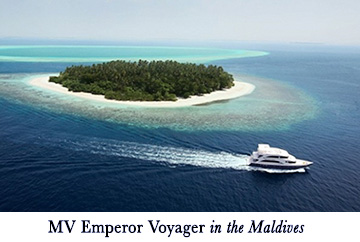 This had been our penultimate dive of a trip that was billed as "The Best of the Maldives." Although the 60-foot visibility on this one-week October trip had not been as good
as on my previous half-dozen Maldives trips, the
diving lived up to its billing, proof of why the
Maldives should be near the top of every diver's
wish list.
This had been our penultimate dive of a trip that was billed as "The Best of the Maldives." Although the 60-foot visibility on this one-week October trip had not been as good
as on my previous half-dozen Maldives trips, the
diving lived up to its billing, proof of why the
Maldives should be near the top of every diver's
wish list.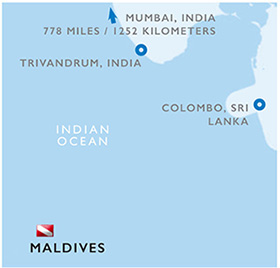 Spread across three decks, the Voyager sports
two twin cabins, one twin bed cabin, three double
bed cabins, and four twin bed cabins, all with
ensuite toilets/showers and air conditioning. I
wished for more individual storage space for us ladies, since we tend to carry
more personal items than the gents. The upper deck, a good place to loll about or
get some sun, has a home cinema with a library of movies, and those shooting video
used it to review their day's footage. Camaraderie among us divers -- Danish,
English, Brazilian, South African, Malaysian and British Asian -- was excellent
English, even among the crew, was the prevalent language aboard.
Spread across three decks, the Voyager sports
two twin cabins, one twin bed cabin, three double
bed cabins, and four twin bed cabins, all with
ensuite toilets/showers and air conditioning. I
wished for more individual storage space for us ladies, since we tend to carry
more personal items than the gents. The upper deck, a good place to loll about or
get some sun, has a home cinema with a library of movies, and those shooting video
used it to review their day's footage. Camaraderie among us divers -- Danish,
English, Brazilian, South African, Malaysian and British Asian -- was excellent
English, even among the crew, was the prevalent language aboard.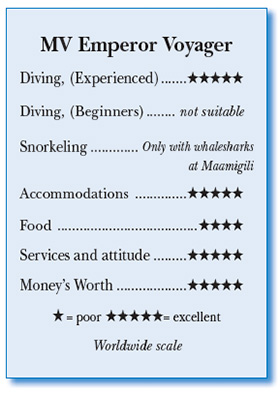 Maaya thilla once claimed to host the world's most frenetic night dive with reef sharks, large marbled stingrays, and turtles mingling with divers to hunt by their light beams. It's less that way now, perhaps a victim of its own popularity that caused animals to move on. On a day dive, with sharks aggregating at the current-point, I watched a giant cuttlefish courting a female while another male hung nearby hoping for an opportunity, kind of like a singles' bar.
Maaya thilla once claimed to host the world's most frenetic night dive with reef sharks, large marbled stingrays, and turtles mingling with divers to hunt by their light beams. It's less that way now, perhaps a victim of its own popularity that caused animals to move on. On a day dive, with sharks aggregating at the current-point, I watched a giant cuttlefish courting a female while another male hung nearby hoping for an opportunity, kind of like a singles' bar.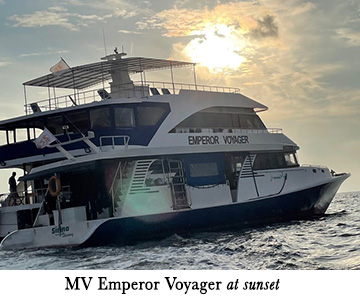 Divers were required to carry a surface market buoy (SMB), which we sent up during our safety stop. Some divers got in an awful tangle with their lines and reels. I watched, amused, as one constantly "tried to knit a sweater" with his line (or that's what we told him it looked like, which he took in good humor). A little practice with these devices before having to rely on them would be wise. If the worst happens, the hospital in Male is said to be quite good at treating DCS.
Divers were required to carry a surface market buoy (SMB), which we sent up during our safety stop. Some divers got in an awful tangle with their lines and reels. I watched, amused, as one constantly "tried to knit a sweater" with his line (or that's what we told him it looked like, which he took in good humor). A little practice with these devices before having to rely on them would be wise. If the worst happens, the hospital in Male is said to be quite good at treating DCS.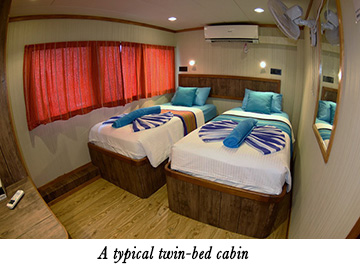 Breakfast, after the first dive of the day, offered our choice of eggs, accompanied by various breads, cereal, hash browns, sausages, baked beans (a British favorite), juices, different fruits, yogurt, tea and coffee. Lunch and dinner were buffet style with local and international options to satisfy all demands and tastes: roast chicken, fish, rice, beef, fries, and assorted curries, and always fruits and salads. I ate well, but often passed on the poor desserts, which were usually gelatinous like semolina; there was never sufficient cake after the day's third dive. The wine was awful. Stick to the Tiger beer.
Breakfast, after the first dive of the day, offered our choice of eggs, accompanied by various breads, cereal, hash browns, sausages, baked beans (a British favorite), juices, different fruits, yogurt, tea and coffee. Lunch and dinner were buffet style with local and international options to satisfy all demands and tastes: roast chicken, fish, rice, beef, fries, and assorted curries, and always fruits and salads. I ate well, but often passed on the poor desserts, which were usually gelatinous like semolina; there was never sufficient cake after the day's third dive. The wine was awful. Stick to the Tiger beer.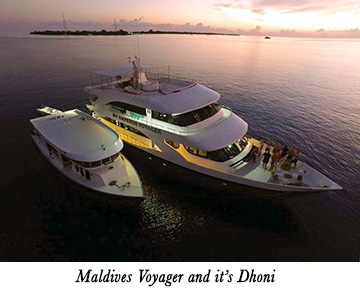 If you lust for colorful soft corals, 'Seventh Heaven' in the southern end of Ari atoll will satisfy you, and if you're lucky, you can snorkel with juvenile whale sharks that come close to the surface from time to time. We weren't lucky. We went for a compensation dive and saw masses of spectacular table corals instead.
If you lust for colorful soft corals, 'Seventh Heaven' in the southern end of Ari atoll will satisfy you, and if you're lucky, you can snorkel with juvenile whale sharks that come close to the surface from time to time. We weren't lucky. We went for a compensation dive and saw masses of spectacular table corals instead. Diver's Compass: I traveled from London via Doha with Qatar Airlines . . . . Transit was easy as long as you are fully vaccinated and met the COVID requirements of your destination . . . The six-boat fleet offers variety of itineraries and trip lengths; the 7-day best of Maldives trip begins at $2150 . . . On the last day, we had to vacate the boat early and spent the day at a hotel before an evening flight . . . there is a luxury hotel on Hulhulč, the airport island . . . payments for extras (such as alcohol or onboard purchases) can be made with credit (three percent charge) or debit cards . . . they add a 10 percent tip to your bill; some divers tipped extra with cash . . . The Maldives is a Muslim country, so dress conservatively when ashore . . . If you visit a local (not a resort) island, take plenty of mosquito repellent with you . . . If you need to rent diving equipment, be sure to give plenty of prior notice . . .
Diver's Compass: I traveled from London via Doha with Qatar Airlines . . . . Transit was easy as long as you are fully vaccinated and met the COVID requirements of your destination . . . The six-boat fleet offers variety of itineraries and trip lengths; the 7-day best of Maldives trip begins at $2150 . . . On the last day, we had to vacate the boat early and spent the day at a hotel before an evening flight . . . there is a luxury hotel on Hulhulč, the airport island . . . payments for extras (such as alcohol or onboard purchases) can be made with credit (three percent charge) or debit cards . . . they add a 10 percent tip to your bill; some divers tipped extra with cash . . . The Maldives is a Muslim country, so dress conservatively when ashore . . . If you visit a local (not a resort) island, take plenty of mosquito repellent with you . . . If you need to rent diving equipment, be sure to give plenty of prior notice . . . 